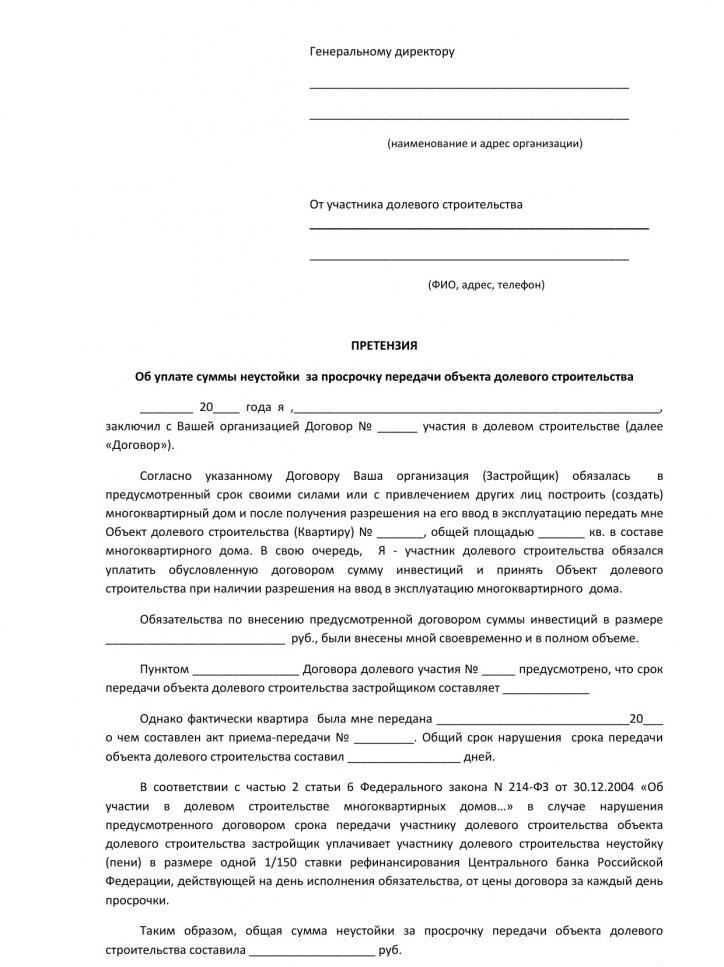Many people prefer to buy apartments in unfinished houses. This gives them the opportunity to get housing at affordable prices, in an optimal area and with the right layout. To do this, between the buyer and the developer is drawn up DDU (equity agreement). It spells out the price of the object, its completion date and other important parameters. If the terms or other terms of the contract are violated, then a penalty is imposed on the developer. Therefore, each person who becomes a participant in the construction must understand the rules for charging this amount.
Legislative regulation
Back in 2005, a special law was adopted Federal Law No. 214 regulating the rules for the participation of citizens in the shared construction of high-rise buildings. A great deal of attention in this legislative act is given specifically to the preparation of the DDU, as well as to the information that should be contained in this agreement.

The main provisions of the law:
- A prerequisite for acquiring real estate in a building under construction is the formation of a DDU, therefore it is not allowed for the shareholder to sign any other agreements, even if the developer insists on it.
- Other contracts are not subject to the rules specified in Federal Law No. 214.
- If the rights of citizens are violated, then they can recover a penalty from the developer.
- When calculating this payment, information from the contract itself or the refinancing rate set at the time of occurrence of the violation by the developer can be used.
A mandatory point is that the DDU should be drawn up exclusively in writing. His registration in Rosreestr is required.
What should be prescribed in the contract
Each person planning to participate in the construction of an apartment building should carefully study the agreement drawn up with the developer to make sure that it contains all the necessary provisions regarding the purchased housing. Many companies can use a variety of tricks with which it will be impossible to recover the penalty from the developer, regardless of what violations he committed.

Be sure to include information in the agreement:
- Exact information about the future house and each apartment (its area, address, number of storeys and other parameters).
- Date when the building should be commissioned.
- The cost of the apartment.
- The procedure on the basis of which money should be contributed by the interest holder for his future housing.
- Warranty period for the apartment.
- Methods on the basis of which the developer will fulfill its obligations under this agreement.
If at least one of the above conditions is missing, then this is the basis for invalidating such an agreement, and there is already a similar judicial practice. The penalty is paid by the developer in violation of standard conditions. Most often this is due to the fact that the object does not give up on time.
The contract may specify the amount of this payment, and if it is absent for any reason, you will have to use the refinancing rate indicator for a specific point in time to calculate.
Developer Responsibilities
The company that builds the facility and with which the DDU is concluded must fulfill all the conditions prescribed in the contract.

Responsibilities of the developer:
- Within the established periods prescribed in the agreement, the facility must be put into operation.
- After the commissioning of the property, apartments are transferred to equity holders.
- The construction process can be implemented on their own or with the involvement of third-party companies specializing in the construction of various objects. This information is reflected in the document.
- It is the developer that bears different risks if for any reason the building is damaged or completely destroyed.
All interest holders can control the execution of the duties of a construction company by checking various documents. Interest holders also have the right to control the progress of work at the construction site. If there are various violations, then citizens may be charged a penalty from the developer.
Shareholders Responsibilities
Participants in the construction should also remember their responsibilities towards the construction company. These include the need for timely transfer of money for the object. All terms are specified in the contract itself.
After putting the facility into operation, you must accept it. If violations are also recorded by equity holders, developers can use different methods of influence.

According to Federal Law No. 214, effective protection of interest holders is provided, therefore, they can not only exact a penalty, but also use other methods. Under certain circumstances, equity holders may terminate the agreement without the consent of the developer.
At what time should objects be delivered
All terms on the basis of which apartments should be transferred to equity holders are indicated in the DDU. This agreement is the same for all citizens involved in the construction of high-rise buildings.
Often, for objective reasons, companies cannot meet the deadline. If the developer can prove that he really is not guilty of such results, then in two months he warns the interest holders that there will be delays in taking the object into operation. The notice proposes to make an addition to the agreement, on the basis of which the previous term is extended.

If this condition is not met, then a penalty is charged from the developer.
Why are you having problems?
Violation of the terms of delivery of the object may be due to various reasons, which include:
- Lack of cash from the company.
- Materials or equipment are not delivered on time.
- Weather conditions are not suitable for the planned work.
- The developer declares himself bankrupt.
- The company is bought back by another organization.
Reasons may appear due to the fault of the company or in its absence. If through the court the company proves that it could not affect the reasons for the delay in construction, then no penalty will be charged.
Collection algorithm
If interest holders are faced with the fact that the deadlines for the delivery of the object are delayed, but there was no notification about this, then they can expect a forfeit. The process itself is divided into stages:
- A calculation is made on the basis of which the optimal payment size is determined.
- Initially, a claim is drawn up against the developer regarding the payment of a penalty.
- A decision regarding the eligibility of the penalty is awaited.
- A lawsuit is filed if the developer ignores the rights of the parties to the contract.
Interest holders can seek recovery of funds on the basis of Federal Law No. 214, Art. 310 Civil Code and Art. 3 GIC.
How payment is calculated
The penalty requirement from the builder must contain information about its size, so first the interest holders themselves must do the calculations.

The amount of the penalty in the absence of the necessary information in the contract is determined as 1/300 of the Central Bank refinancing rate. It is necessary to use information about this rate on the day when a lawsuit is filed with the court or a claim to the developer.
If the equity holder is an individual, then under Art. 6. Federal Law No. 214 is charged a penalty in double amount.
Calculation Example
Let's look at an example of how the amount of the penalty is charged. An individual is an interest holder, therefore 2/300 refinancing rates are charged.On the day when this case is being considered, a rate of 7.75% has been established. The apartment has a cost of 2.3 million rubles. The delay itself is equal to a year, so the deadline was overdue for 365 days.
Under such conditions, the penalty will be as follows: 2,300,000 x 365 x 2/300 x 7.75 / 100 = 433,742 rubles. Due to the long delay, a significant amount of funds is accrued. And if many equity holders have such a problem, the developer is obliged to pay money to all of them. Therefore, often when there is a delay, the company offers interest holders the opportunity to pay a smaller amount without a court. Citizens have the right to decide whether they will go to court or agree to the proposal of the developer.
Rules for Pretrial Recovery
Before applying to the court, a claim is drawn up to the developer on payment of the penalty. This stage cannot be missed, since the court will necessarily require proof of an attempt to resolve the issue peacefully.
The process of pre-trial resolution of such a problem is divided into stages:
- Claim preparation. Below is a sample of it. The penalty is paid by the developer on the basis of information from this document. In this case, the problem arises on a voluntary basis.
- The claim must include references to laws, as well as extracts from the contract itself.
- A document is made in duplicate. One document is handed over to the company, and on another the acceptance mark is put, after which it remains with the citizen.
- In order to guarantee the correctness of registration of such a claim, it is recommended to use the help of an experienced lawyer.
- The document must make the correct calculation of the penalty. Often in the DDU additional payments are provided, which can also be collected from the developer.
- The point is indicated that citizens suffered losses due to a delay in the deadline, as they were forced to rent housing.
- Together with the claim, a package of documents is transferred to the developer. It includes a copy of the shareholder’s passport, a copy of the DDU and documents confirming the deposit of funds for the apartment.
- Documents must be sent with a list of attachments and a receipt of receipt. You can also visit the office of the company to transfer papers to the secretary.
When contacting the developer directly, you need to require that a special mark be put on the second copy of the claim to the developer. Forfeits should be paid based on information from this document.
How to make a claim?
A sample of the recovery of the penalty from the developer through the claim is presented below.

When compiling this document, the following requirements are taken into account:
- The company name is precisely spelled out. Information can be taken from the DDU.
- The registration data of the agreement is indicated.
- All the requirements of the applicant are given, on the basis of which a penalty is collected from the developer under the shared agreement.
- Various explanations are made for calculating this amount.
- All documents attached to the claim are described separately.
- The date of submission of the application and the signature of the citizen are affixed.
A refusal to award a penalty may be due to the lack of information about the applicant in the document.
A sample claim to the developer about the penalty is made as clear and convenient as possible. It is only necessary to enter data on the citizen in the existing form. It is not required to use any unified documents, therefore it is allowed to write an application in a free form.
Judicial Enforcement Procedure
Often, developers do not respond to claims or make a negative decision. They hope that interest holders will not go to court.
Under such conditions, it is necessary to file a lawsuit in court so that, on the basis of the decision, the necessary amount will be recovered from the violator of the contract.
Preparation of a claim and other documents
A statement of claim for a penalty from the developer may be made independently or by a invited lawyer. The document should contain the following items:
- The requirement to recover the penalty and payment of compensation for moral damage.
- Name and address of the court where the lawsuit is filed.
- Name of plaintiff and address of registration.
- Information about the defendant.
- The nature of the violation of the rights of equity holders, and also lists all their requirements.
- Justification of requirements by legislative acts.
- Official documents confirming the eligibility of the requirements of interest holders.
- Information about the price of the claim, and it should not be spontaneous. Therefore, the penalty and other payments are correctly calculated in advance if necessary to recover them.
The claim is accompanied by other documents that are submitted by the DDU, payment papers, receipts on payment of state duties and correspondence with the developer. If there is no evidence that the shareholder tried to solve the problem in a pretrial way, the court will refuse to accept the claim.

Which court to apply to
A lawsuit is drawn up and submitted to various courts:
- At the place of registration of the construction company.
- At the place of residence of the plaintiff.
- At the place where the contract was drawn up between the two parties.
- At the location of the facility under construction.
- If the amount of the penalty does not exceed 50 thousand rubles, then the case is considered in a magistrate court.
The penalty from the developer may be reduced if its size is not commensurate with the damage caused. Therefore, it is important to correctly approach the calculation of this payment.
Excitation of production
The claim for the recovery of the penalty from the builder is submitted to the court, after which the date of the meeting is set. On the basis of the court decision, a writ of execution is provided to the plaintiff.
This document should be addressed to the bailiffs so that they begin the forced collection of funds from the developer. It can also be sent to a bank where there is a current account of a construction company.
What tricks do developers often use
Many companies are aware that for various reasons they can delay the completion of the facility, so even when drawing up a DDU, they often use different tricks, based on which they can avoid transferring forfeiters in the future. These include the following:
- Instead of the DDU, an investment contract or other contract is drawn up.
- It is proposed to equity holders to draw up a preliminary contract for the purchase of an apartment, after which the transaction is finalized three months after the delivery of the property. Under such conditions, citizens are not protected from extension of terms.
- Often there is a DDU with the simultaneous purchase of insurance. However, there is a high probability that the extension of the terms will not be an insured event, therefore, interest holders will not receive compensation for their losses.
- Payment can be made through a loan agreement. Therefore, if the terms are broken, the developer returns the money with a bill of exchange, on the basis of which you can buy another object from this company.
If the developer is a fraudster, then he can use the scheme of double sale of apartments, with which he can get additional funds to complete the project.
People seeking to purchase housing in houses under construction should have a good understanding of how the contract with the developer is drawn up correctly and what information must be contained in it. If there are violations on the part of the construction company, then citizens can count on forfeit. You need to know how it is correctly calculated and charged. Initially, you need to try to get the money in a pre-trial way, but if it does not bring the desired result, then the interest holders will have to go to court. To do this, you need to understand the rules for preparing an application and preparing other documents.
